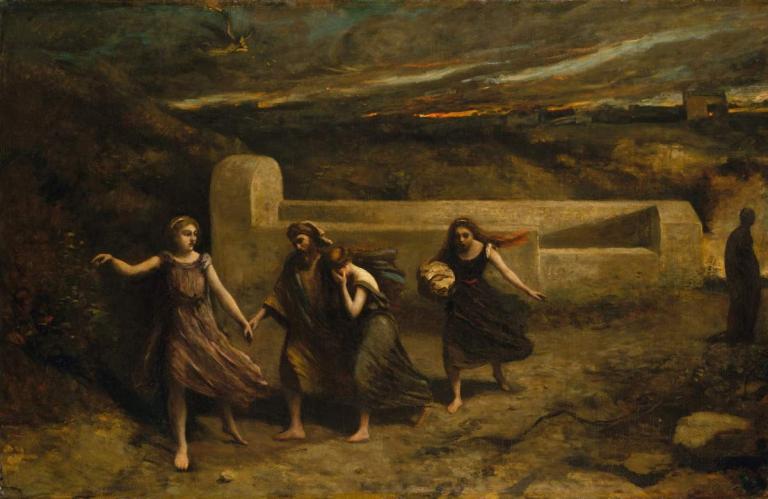
For centuries, the word “sodomite” has been flung around like a theological dodgeball, aimed squarely at queer folks by those who apparently skipped the part of the Bible where God commands love and compassion. But what if I told you the term has been misused? What if, instead of fixating on consensual relationships between adults, we took the Bible at its word—specifically Ezekiel 16—and used “sodomite” as a label for those who fail to care for the poor, the immigrant, and the marginalized? Buckle up, because we’re about to play the Bible game on conservatives’ own terms.
What Does the Bible Actually Say About Sodom?
First, let’s turn to Ezekiel 16:49-50, where God lays out Sodom’s real sin:
“Now this was the sin of your sister Sodom: She and her daughters were arrogant, overfed and unconcerned; they did not help the poor and needy. They were haughty and did detestable things before me. Therefore I did away with them as you have seen.”
Did you catch that? The first indictment isn’t about what happens behind closed doors; it’s about arrogance, gluttony, and a lack of concern for the vulnerable. God’s beef with Sodom was their refusal to help the poor and needy—a glaring failure of compassion that echoes loudly in our own society.
But here’s the kicker: if we’re honest with ourselves, many of us—especially those waving Bibles while cutting social safety nets—fit this description far better than the people they’re busy condemning.
Who Are the Real Sodomites?
Think about it. Sodom was destroyed because its people were too self-absorbed to care for the oppressed, the immigrant, the hungry. Now, fast-forward to today. We see politicians and pundits rallying against programs that feed the poor or shelter refugees. We see churches that spend millions on fancy buildings while their communities go hungry. We see laws passed to criminalize unhoused people instead of helping them find shelter.
If ignoring the needy was Sodom’s sin, then maybe it’s time we start redefining “sodomite.” Not as a slur for LGBTQ+ individuals, but as a descriptor for those who perpetuate policies and attitudes of apathy and cruelty toward the vulnerable.
Let’s Self-Identify as Sodomites
If we’re going to take the Bible seriously—and I mean really seriously—then anyone who fails to help the poor and marginalized should proudly wear the title of sodomite. Didn’t donate to a food bank this year? Sodomite. Voted against funding for affordable housing? Sodomite. Scoffed at the idea of letting refugees into the country? You guessed it—sodomite.
And lest you think I’m being too harsh, let’s revisit Ezekiel 16. God isn’t vague about the consequences of these failures. Sodom’s arrogance and lack of compassion led to its total destruction. So, if the shoe fits—or in this case, if the ashes match—we need to own up to it.
Playing the Bible Game
This is where it gets fun. For too long, conservatives have wielded the Bible like a club, cherry-picking verses to condemn others while ignoring the broader, more challenging teachings. They’ve weaponized the term “sodomite” against LGBTQ+ folks without considering the biblical definition.
So, let’s turn the tables. Let’s play their game. If someone starts tossing around accusations of being a sodomite, ask them how they’re caring for the poor, the immigrant, and the marginalized. Ask them if they’re working to dismantle systems of oppression or if they’re complicit in maintaining them.
Jesus said, “Whatever you did not do for one of the least of these, you did not do for me” (Matthew 25:45). By that standard, failing to care for the vulnerable is a direct affront to Christ himself. And if that’s not a sobering thought, I don’t know what is.
A Call to Action
Here’s the uncomfortable truth: we’re all at risk of being sodomites by Ezekiel’s definition. We’ve all fallen short when it comes to caring for the poor and needy. But the good news is that this isn’t a death sentence—it’s a call to action.
What would it look like to redefine “sodomite” in our churches, our communities, and our political systems? What if, instead of using the term to shame and ostracize, we used it to hold ourselves accountable?
- Instead of building bigger churches, let’s build bigger food banks.
- Instead of closing borders, let’s open our hearts to those seeking refuge.
- Instead of cutting funding for social programs, let’s invest in the well-being of our neighbors.
In other words, let’s stop being sodomites and start being followers of Jesus.
The Fate of Sodom Awaits Us
The story of Sodom isn’t just a cautionary tale for individuals—it’s a warning for societies. If we continue to prioritize arrogance, excess, and indifference over compassion and justice, we’re setting ourselves up for a similar fate.
But there’s hope. The Bible is full of stories of redemption, of communities that turned away from sin and embraced god’s call for justice and mercy. We can be one of those stories if we’re willing to do the work.
So, let’s reclaim the term “sodomite” and use it to confront the real sins in our world. Let’s challenge ourselves and others to live up to the biblical standard of caring for the least of these. And let’s remember that the path to redemption isn’t through judgment, but through love.
In the end, the question isn’t who we’re pointing fingers at—it’s who we’re standing with. And if it’s not the poor, the immigrant, and the marginalized, then we might as well start dusting off the ashes now.
Also, if you’ve been digging my work on here, and want to see me be able to continue writing as close to full-time as humanly possible, please take a look at my Patreon page at www.patreon.com/mjdistefano. Even $1 a month helps bigly!














